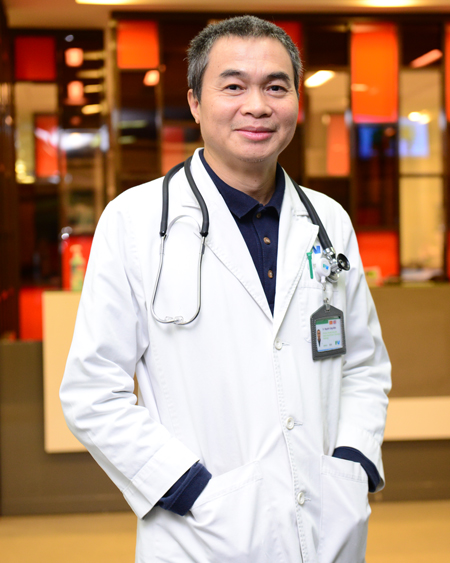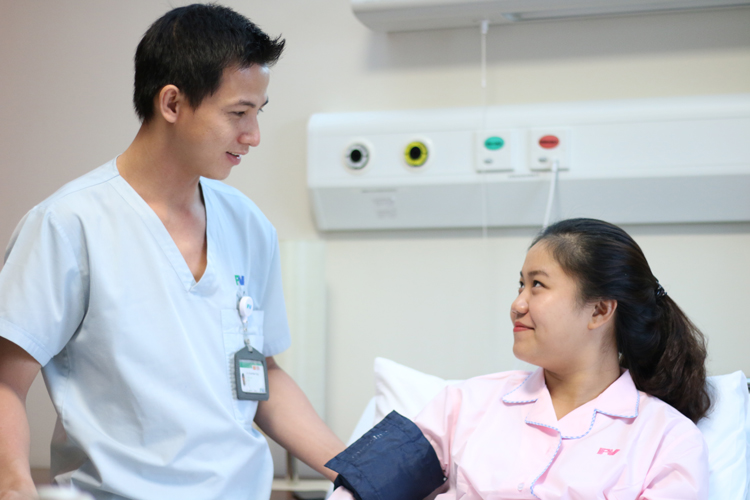Dr Nguyen Cong Kiem, who has accumulated almost 30 years of experiences in his field, has recently assumed a new role as Deputy Head of Gastro-Enterology & Hepatology at FV Hospital. Prior to joining FVH, he worked for 10 years as Head of the Gastroenterology & Hepatology Department at a public hospital in Ho Chi Minh City. Dr Kiem shared some thoughts with the Nu Doanh Nhan (“Businesswoman”) Magazine on his perception of the differences between those two workplaces. Below is an excerpt from the interview.
How do you see your new job?
Early this year I started working at FVH. I leave the house at 06:00 and do not arrive home until 19:30, later than when I was still working in the public sector. However, I now wake up with an eagerness to go to work, and that remains my daily spirit. I no longer work at private clinics.
At FVH, everything is clean and high quality. Everyone is friendly, open, and willing to help each other happily. The bonds among the CEO, the management and the staff are like those in a family, even though this is a high-pressure hospital environment.
I think the most obvious difference is that everyone at the hospital does their best for their patients. All tasks are performed in compliance with written JCI procedures and standards. FV’s strong safety culture means that the safety of patients is ensured at the highest level.

The Ministry of Health requires that the minimum consultation length per patient should be an average of 13.5 minutes. However, our public hospital system has been overloaded for so long that in departments with too many patients, the doctor has to consult many patients, one after the other extremely quickly, because of their limited time.
While providing consultation, if doctors see the waiting list is very long, their only solution is to speed up. The doctors are exhausted while the patients are also tired due to their prolonged waiting time and often feel that they are not getting the attention they need.
Now, I can consult each patient for about 30 minutes, 70 per cent of which is spent talking to diagnose the disease and advising on the most appropriate medical and non-medical therapies for each patient.
So why should doctors consult so closely?
Because a doctor is the patient’s companion and every patient is unique.
I want to add a comment regarding patient safety. At the hospital I worked at before, there was only one gastroscope as we could not afford more machines. The total duration of one gastroscopic examination was 10 minutes, including three minutes of endoscopy and seven minutes of partial disinfection of the endoscope. This meant that we could complete six cases in one hour and, when needed, dozens of cases could be handled.
You should know that seven minutes is not enough time to guarantee 100 per cent sterilisation, but because of the huge equipment investment costs and work pressure, there was no other choice. At FV, the entire disinfection time of the endoscope is 45 minutes.
It must be added that modern machinery and equipment do help doctors to work very well with maximum efficiency. Concurrently, diagnosis tends to be highly accurate and doctors are able to do their very best for their patients. The world’s medical industry is constantly developing so doctors always have to keep furthering their expertise to keep up. I find the FVH environment to be extremely motivating for doctors keen to develop their career because it allows them time for continuous self-improvement.

Can you tell me about other members of the hospital staff?
I have also had time to observe the postoperative care service here, and I’ve been really impressed. After a patient undergoes surgery, nurses and nurse assistants are always dedicated to helping them in their pain management as directed by physicians. The nurses help to prevent falls, offer bedside care and personal hygiene assistance 24 hours a day, help patients to regain their mobility as soon as possible, as well as spend time talking with and sharing the patient’s experience as if they were family members. Patients do not need to bother their relatives for inpatient support.



